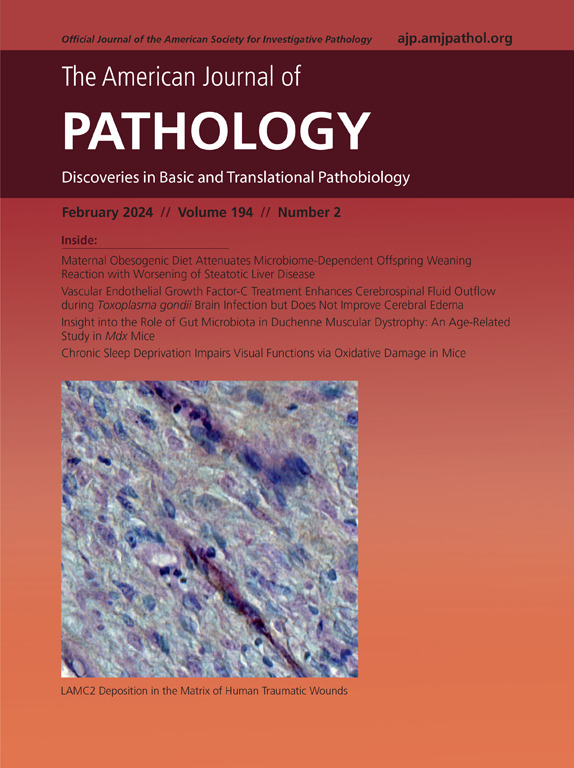Macrophage Migration Inhibitory Factor Contributes to Adverse Outcomes of Experimental Gestational Malaria across Pregnancy Stages
IF 3.6
2区 医学
Q1 PATHOLOGY
引用次数: 0
Abstract
Malaria infection during pregnancy, particularly caused by Plasmodium falciparum, poses significant risks, such as maternal anemia, low birth weight, preterm delivery, and increased infant mortality. This study investigated the role of macrophage migration inhibitory factor (MIF) in modulating pregnancy outcomes in a mouse model of gestational malaria. Herein, Mif-deficient (Mif–/–) and Mif-sufficient (wild-type) mice were used to evaluate the impact of MIF on maternal-fetal immune interactions during Plasmodium infection in three different stages of pregnancy. Mif–/– mice exhibited lower embryo resorption rates, preserved decidualization, and improved spiral artery remodeling compared with wild-type counterparts. Notably, although Mif deficiency was associated with increased parasitemia levels in late gestation, a shift toward a more anti-inflammatory phenotype in the uteroplacental tissues of infected mice contributed to better pregnancy outcomes. These results highlight the complex interplay between immune regulation and pregnancy in the context of malaria, indicating that targeting Mif may offer a therapeutic strategy to mitigate adverse pregnancy effects in infected individuals.
巨噬细胞迁移抑制因子与实验性妊娠期疟疾的不良结局有关。
怀孕期间感染疟疾,特别是由恶性疟原虫引起的疟疾,会带来重大风险,如孕产妇贫血、出生体重过低、早产和婴儿死亡率增加。本研究探讨巨噬细胞迁移抑制因子(MIF)在调节妊娠期疟疾小鼠模型妊娠结局中的作用。本研究使用Mif缺乏(Mif-/-)和Mif充足(野生型)小鼠来评估妊娠三个不同阶段Mif对疟原虫感染期间母胎免疫相互作用的影响。与野生型小鼠相比,Mif-/-小鼠表现出较低的胚胎吸收率、保留的去个别化和改善的螺旋动脉重塑。值得注意的是,尽管Mif缺乏与妊娠后期寄生虫血症水平增加有关,但感染小鼠子宫胎盘组织向更抗炎表型的转变有助于更好的妊娠结局。这些结果强调了疟疾背景下免疫调节与妊娠之间复杂的相互作用,表明靶向Mif可能提供一种治疗策略,以减轻感染者的不良妊娠影响。
本文章由计算机程序翻译,如有差异,请以英文原文为准。
求助全文
约1分钟内获得全文
求助全文
来源期刊
CiteScore
11.40
自引率
0.00%
发文量
178
审稿时长
30 days
期刊介绍:
The American Journal of Pathology, official journal of the American Society for Investigative Pathology, published by Elsevier, Inc., seeks high-quality original research reports, reviews, and commentaries related to the molecular and cellular basis of disease. The editors will consider basic, translational, and clinical investigations that directly address mechanisms of pathogenesis or provide a foundation for future mechanistic inquiries. Examples of such foundational investigations include data mining, identification of biomarkers, molecular pathology, and discovery research. Foundational studies that incorporate deep learning and artificial intelligence are also welcome. High priority is given to studies of human disease and relevant experimental models using molecular, cellular, and organismal approaches.

 求助内容:
求助内容: 应助结果提醒方式:
应助结果提醒方式:


